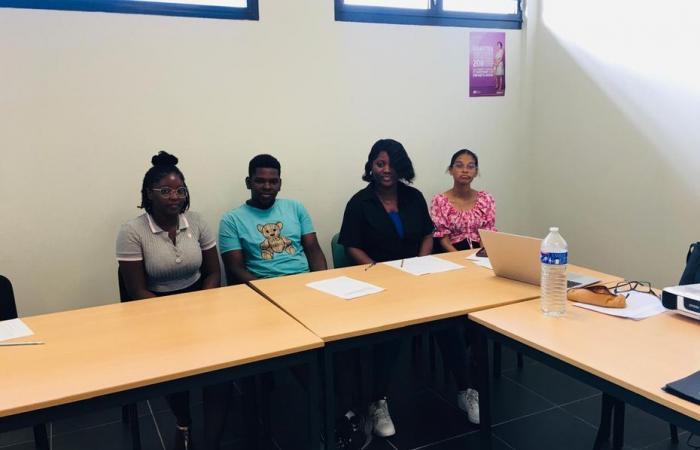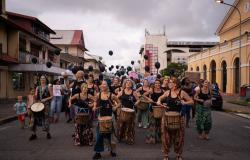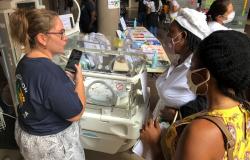Percentages linked to difficulties in basic learning such as reading and writing are much higher in Guyana than elsewhere. This affects all audiences and particularly the non-speaking public where 7 out of 10 adults have serious difficulties with writing because they do not have French as their mother tongue. Three quarters of them, limited in writing and calculation, find themselves unemployed. An alarming observation. There are several measures to combat illiteracy, some centers provide “Skills enhancement” training. We met some of these interns.
At the OKA Formation center in Rémire-Montjoly, young adults are trying to find the means to improve their knowledge, both written and oral. The goal is to acquire more resources and skills in order to apply for a job or to pursue specific training to practice the profession that interests them. These trainees are generally followed by the “ Mission locale ».
•
©DR
There are seven of them this November afternoon in the room. Two girls, five boys, some are absent. On the board is a diagram to explain the procedures to follow to navigate the administrative maze. These young adult learners do this 3-month internship for a “ Promotion of their skills “. They have difficulty writing or understanding what they read.
However, these trainees all attended school and one of them obtained his professional baccalaureate. The factors that lead these young people to illiteracy are multiple, explains the trainer : « They are all projects but they don't necessarily know how to do it. The training must help them rebuild their idea of work to gain confidence and discover things. Today, for example, we are studying the different types of employment contracts. »
Rosana Azur has been an adult trainer for 8 years, she knows the audiences she supports well : « J. has difficulty writing because French is not his mother tongue, although he obtained his baccalaureate. It comes from the river. He has lots of skills, is very proactive on social networks and supports his comrades. What I see is that now in the school system, there are not enough requirements for mastery of writing. Students get what they want by asking Google orally. In addition, most of them know how to use AI (artificial intelligence) which can be provided orally. This gives them the written information they need. They have these automatisms. However at some point this becomes an obstacle, they realize this when they have to take prerequisite tests to access training. You must know how to read, write and understand. They come to us because they do not have this control. They will have exams where they will be judged on their writing. To overcome the pitfall, they must follow these adult training courses. »
Mr. 22 years old chose this training to improve his French, both written and spoken. He was at Balata high school where he learned to make frames. Rosana Azur points out that M. went to high school until his baccalaureate but his dyslexia was never detected, just like his dysorthography. “He’s not doing it on purpose,” she emphasizes. he has a cognitive difficulty. We have been in training since September when I send him to the board for activities, I see that he is confusing the letters. During an individual interview, I realized this. The school system is incomplete. »
If there is no monitoring of children, some of whom live in a difficult and illiterate family environment, with overcrowded classes, many of them end their schooling in a situation of failure.
“They have potential, motivation while also having a refractory side because they know that they have difficulty expressing themselves. They are afraid of criticism and mockery and prefer to stay in the background and say nothing, not express themselves. Many ask me for more complementary activities to do at home to better prepare themselves for the profession they have chosen and to find their way. Those who are more comfortable with digital I send them links and those who are more comfortable with writing, I provide them with activities on paper. » specifies Rosana Azur.
In addition, some of these trainees find themselves in very delicate positions with family, transport and food issues and they expect a lot from the training. For many of them, these internships are simply an opportunity to get paid and thus live while waiting to find a job.
L, aged 22, lives in Cogneau in Matoury. Arriving from Haiti at the age of 17, she attended school from the second to the final year, bac pro reception option at the Anne-Marie Javouhey high school in Cayenne without obtaining the diploma. Today, this training is essential for her, to refine her professional orientation and make the right choice. She does not want to be a reception agent because she does not feel capable of being in permanent contact with the public. She would have preferred to go into hairdressing but again, the apprenticeship course does not seem suited to her profile:
« I have trouble expressing myself, making sentences, I'm afraid of saying stupid things. I can use the computer. I've been doing this course for a month and I'm making progress. I learned to use the internet, to send emails, to read publications on careers… »
The young woman received 380 euros in subsidies from the local Mission but she has to juggle financially to travel, feed herself and find accommodation. She will soon have to leave her grandmother's home.
In the meantime, she is holding on to finalize her plan to become a care assistant. For this, this refresher course in French to read and speak correctly is essential in order to continue training and become a life assistant.
T, a 21-year-old young man, was directed towards this internship thanks to his advisor from the local Mission. « What interests me particularly are the French refresher courses and reading to allow me to get started in what I want to do : become a DJ or take other training. I want to be able to express myself in front of people. »
Indeed, during this training, trainees must little by little discover what really suits them professionally in order to eventually be able to move on to the training necessary to continue their career.
According to a recent INSEE survey published on November 7, 41% of 18/64 year olds in Guyana are in difficulty in at least one of the three fundamental areas : reading 26%, writing 39% and comprehension 40%.
Despite the numerous measures put in place to combat illiteracy, there is still much to do in a territory where training resources have certainly been increased but still remain insufficient in the face of a population which continues to increase.
The INSEE publication can be found here : https://www.insee.fr/fr/statistiques/8275440






